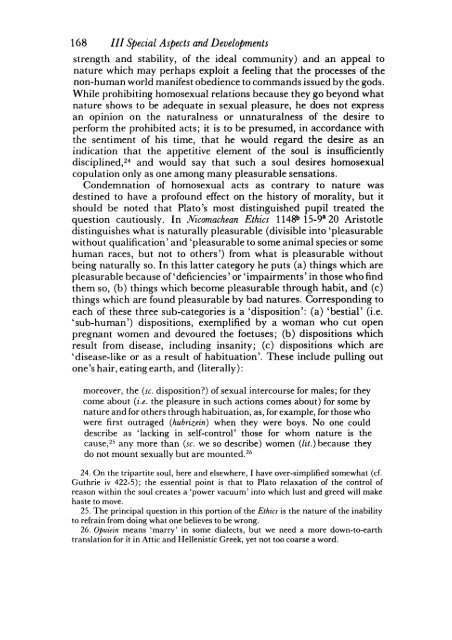GREEK HOMOSEXUALITY
k-_j-_dover_greek_homosexuality_updated_and_witbookfi-org
k-_j-_dover_greek_homosexuality_updated_and_witbookfi-org
- No tags were found...
You also want an ePaper? Increase the reach of your titles
YUMPU automatically turns print PDFs into web optimized ePapers that Google loves.
168 III Special Aspects and Developments<br />
strength. and stability, of the ideal community) and an appeal to<br />
nature which may perhaps exploit a feeling that the processes of the<br />
non-human world manifest obedience to commands issued by the gods.<br />
While prohibiting homosexual relations because they go beyond what<br />
nature shows to be adequate in sexual pleasure, he does not express<br />
an opinion on the naturalness or unnaturalness of the desire to<br />
perform the prohibited acts; it is to be presumed, in accordance with<br />
the sentiment of his time, that he would regard the desire as an<br />
indication that the appetitive element of the soul is insufficiently<br />
disciplined, 24 and would say that such a soul desires homosexual<br />
copulation only as one among many pleasurable sensations.<br />
Condemnation of homosexual acts as contrary to nature was<br />
destined to have a profound effect on the history of morality, but it<br />
should be noted that Plato's most distinguished pupil treated the<br />
question cautiously. In Nicomachean Ethics 1148b 15-9 8 20 Aristotle<br />
distinguishes what is naturally pleasurable (divisible into 'pleasurable<br />
without qualification' and 'pleasurable to some animal species or some<br />
human races, but not to others') from what is pleasurable without<br />
being naturally so. In this latter category he puts (a) things which are<br />
pleasurable because of' deficiencies' or 'impairments' in those who find<br />
them so, (b) things which become pleasurable through habit, and (c)<br />
things which are found pleasurable by bad natures. Corresponding to<br />
each of these three sub-categories is a 'disposition': (a) 'bestial' (i.e.<br />
'sub-human') dispositions, exemplified by a woman who cut open<br />
pregnant women and devoured the foetuses; (b) dispositions which<br />
result from disease, including insanity; (c) dispositions which are<br />
'disease-like or as a result of habituation'. These include pulling out<br />
one's hair, eating earth, and (literally):<br />
moreover, the (sc. disposition?) of sexual intercourse for males; for they<br />
cotne about (i.e. the pleasure in such actions comes about) for some by<br />
nature and for others through habituation, as, for example, for those who<br />
were first outraged (hubrizein) when they were boys. No one could<br />
describe as 'lacking in self-control' those for whom nature is the<br />
cause, 25 any more than (sc. we so describe) women (lit.) because they<br />
do not mount sexually but are mounted. 26<br />
24. On the tripartite soul, ht;re and elsewhere, I have over-simplified somewhat (cf.<br />
Guthrie iv 422-5); the essential point is that to Plato relaxation of the control of<br />
reason within the soul creates a 'power vacuum' into which lust and greed will make<br />
haste to move.<br />
25. The principal question in this portion of the Ethics is the nature of the inability<br />
to refrain from doing what one believes to be wrong.<br />
26. Opuiein means 'marry' in some dialects, but we need a more down-to-earth<br />
translation for it in Attic and Hellenistic Greek, yet not too coarse a word.


